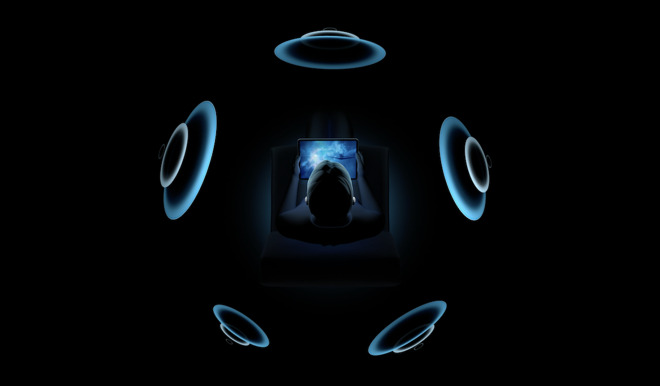AirPods Pro 'Spatial Audio,' AirPods with auto-switching coming in iOS 14
Apple's AirPods software is being updated with new automatic device switching and a surround sound Spatial Audio mode for AirPods Pro.

Spatial Audio will bring a surround sound-like experience to AirPods Pro. Credit: Apple
All AirPods models will now seamlessly move between devices without the need for a user to manually switch. If your AirPods are connected to your iPad, they'll automatically switch over to your iPhone when you take a call, for example.
The higher-tier AirPods Pro will also receive a new Spatial Audio feature that will mimic an immersive surround sound and movie theater-like experience. In other words, the audio will sound like it's actually coming from around the wearer.
Spatial Audio relies on tricks, like the built-in accelerometer, to monitor a user's head motions so that its sound field stays fixed.
When it launches, Spatial Audio will support audio encoded in 5.1, 7.1 and Dolby Atmos.

Spatial Audio will bring a surround sound-like experience to AirPods Pro. Credit: Apple
All AirPods models will now seamlessly move between devices without the need for a user to manually switch. If your AirPods are connected to your iPad, they'll automatically switch over to your iPhone when you take a call, for example.
The higher-tier AirPods Pro will also receive a new Spatial Audio feature that will mimic an immersive surround sound and movie theater-like experience. In other words, the audio will sound like it's actually coming from around the wearer.
Spatial Audio relies on tricks, like the built-in accelerometer, to monitor a user's head motions so that its sound field stays fixed.
When it launches, Spatial Audio will support audio encoded in 5.1, 7.1 and Dolby Atmos.

Comments
Now, it's a matter of time before they implement this for Apple Music. Tidal recently announced availability of Dolby Atmos surround mixes for music on that service, with an Atmos-capable app on AppleTV. Audiophile quality and surround mixes of music has always been a niche market, because it requires end-users to have specialized hardware, reducing the number of people who are able to use the feature, whether that's quad systems and vinyl back in the 70s, SACD, DVD audio and Blu Ray audio, all requiring specialized playback hardware and speakers. With AppleTV, at least some customers have surround speakers set up in their home theaters. Although that's likely more widespread than previous iterations of audiophile capable setups, it's still probably a niche thing. With spatial audio rolling out on AirPods Pro, the use case for streaming of surround/Atmos music is suddenly no longer a niche market. It'll be in millions of people's pockets instantly. If they don't announce this for Apple Music during WWDC, they will soon.
Can you imagine. What happens if a person turns their iPad around to face away from them? It'll be Charles Manson all over again.
Binaural audio has been a real thing for a long time (apparently first with the théâtrophone in 1881). Search the term binaural audio on the internets and you'll find examples of 'spatial audio' that will work with whatever headphones or earbuds you already have. The innovation here is the detection of head movements and on-the-fly computations that will let you move around within the aural 'space.' They couldn't do that in 1881.
Question though, will this be similar to Audeze's Mobius headset?.. it sounds similar to what they are doing but not sure if this is something else as the Mobius is marketed as a 'gaming' headset.